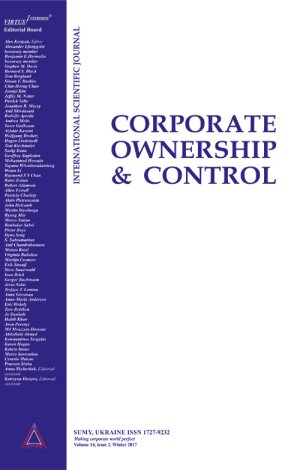
-
 Journal menu
Journal menu

- General information
- Editorial Board and External Reviewers
- Journal Policies
- Publication Ethics and Malpractice Statement
- Instructions for authors
- Paper reviewing
- Article processing charge
- Feedback from stakeholders
- Journal’s Open Access statement
- Order hard copies of the journal
- 50 most cited papers in the journal
CORPORATE GOVERNANCE AND FIRM PERFORMANCE: A COMPARATIVE ANALYSIS OF AUDITING PROBLEMS
Download This ArticleAbstract
The recent financial crises have created a new debate about comparison and convergence of different systems of corporate governance. In particular, they have underlined poor efficiency of rule structures to achieve a good relationship between different stakeholder’s rights. In line with many studies of corporate governance that emphasize the manager-stakeholders relationship as explained by agency theory, in this paper, I analyse the role of auditing as an incentive device to reduce contractual or transaction costs related to asymmetric information.Considering as a benchmark the recent US Sarbanes Oxley Act of July 2002. I describe a set of auditing principles by comparing common and civil corporate laws. First, by using multiple correspondence analysis on six countries and twenty-seven dummy variables on auditing rules, I identify the main variables that form the auditing index. Second, I test the hypothesis that a suitable rule structure can improve the capability of financial markets to estimate the fair value of firms. In particular, I analyse the problem of the effects of direct and indirect monitoring rules for managers on the market value of public companies. The results obtained highlight a different relationship between auditing principles and firm performance from that expected on the basis of the legal framework.
Keywords: Corporate Governance, Company Law, Market Structure, Firm Performance, Auditing
How to cite this paper: Auci, S. (2006). Corporate governance and firm performance: A comparative analysis of auditing problems. Corporate Ownership & Control, 4(1-1), 177-194. https://doi.org/10.22495/cocv4i1c1p2

















